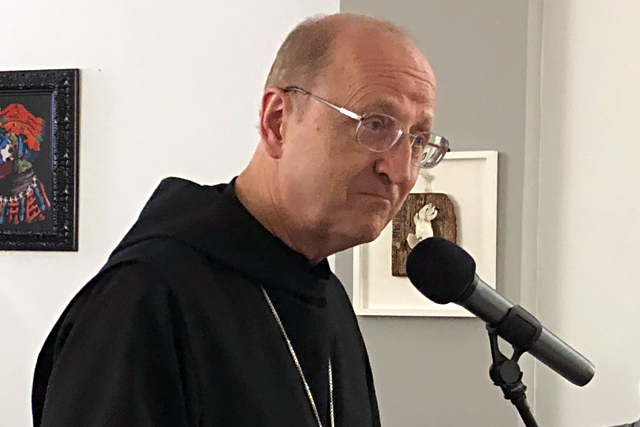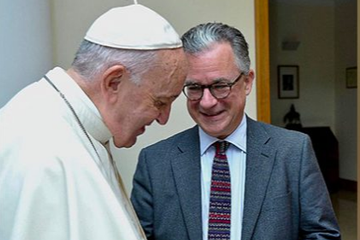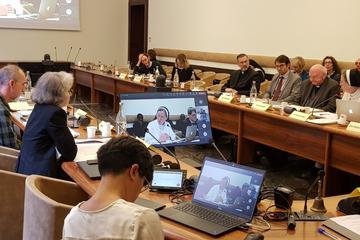
ROME – The Abbot Primate of the Benedictines, Abbot Gregory Polan, led the final conference in The Lay Centre’s Lenten series, “Antidotes to a Throwaway Culture,” March 1. He spoke about the throwaway culture as it affects one’s interior life in his presentation titled, “Listening with the Ear of Your Heart.”
The title was taken from the Rule of St. Benedict. He shared his reflection on how people can learn to work against the urge to eliminate “wasted time” from their busy schedules. He spoke about how “wasted time” — such as time to be with friends or to just be with God — can be precious.
One way to “waste time” is with lectio divina, a practice rooted in Benedictine spirituality. This type of “careful, precise listening” is “not dry but touched with the fibers of experience,” he said.
The words one receives in prayer during lectio divina are not to be thrown away, but to be examined and reflected upon: “What happens inside us? We should be growing in wisdom, cultivating a life based on the received words to live a life with joy,” said Abbot Polan.
Donna Orsuto, Lay Centre director, offered a response based on the Benedictine rule and the term, “astonished ears,” as a way to imagine sacred listening. The abbot added that, regardless of the number of times one reads a Scripture passage, one’s ears can still be “astonished” at the Word of God.
Prior to being elected Abbot Primate in 2016, Abbot Polan was the longtime abbot of Conception Abbey in Conception, Missouri. He recounted how, in 2002, a gunman opened fire in Conception Abbey, killing two monks. The community was in complete shock and horror at this act of violence.
Without choosing the reading, because the monks cycle through the Bible, they sat down for their first community lectio divina after the shooting. The passage was Romans 12:9-18, and it “utterly astonished” them, said Abbot Polan.
The verses read: “Let love be sincere; hate what is evil, hold on to what is good; love one another with mutual affection; anticipate one another in showing honor. Do not grow slack in zeal, be fervent in spirit, serve the Lord. Rejoice in hope, endure in affliction, persevere in prayer. Contribute to the needs of the holy ones, exercise hospitality. Bless those who persecute [you], bless and do not curse them. Rejoice with those who rejoice, weep with those who weep.
Have the same regard for one another; do not be haughty but associate with the lowly; do not be wise in your own estimation. Do not repay anyone evil for evil; be concerned for what is noble in the sight of all. If possible, on your part, live at peace with all.”
“He put his whole person into the talk. It was marvelous to listen to a voice that came from many years of profound spiritual deepening,” said Lay Centre student Aljaž Kranjc, who is studying at the Pontifical Institute for Islamic and Arabic Studies.
Drew Gai, a student at St. Mary’s University in California, who is studying at the Angelicum this semester, concurred.
“He made me reflect on the attention I give to my prayer life. Both by his words of encouragement and his witness of authentic peace and joy; obviously born from a profoundly contemplative life,” said Gai.
The abbot’s presentation talk was followed by an ecumenical Vespers service, led by Rev. Tim Macquiban of the Methodist Church in Rome. Archbishop Bernard Ntahouri, the Archbishop of Canterbury’s Personal Representative to the Holy See, was also present.


